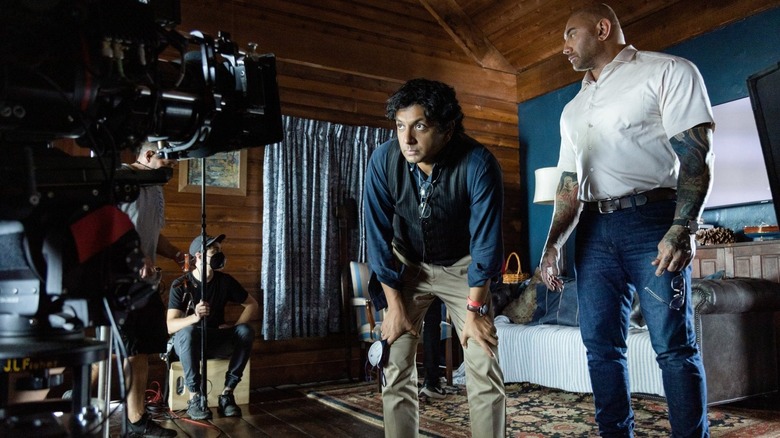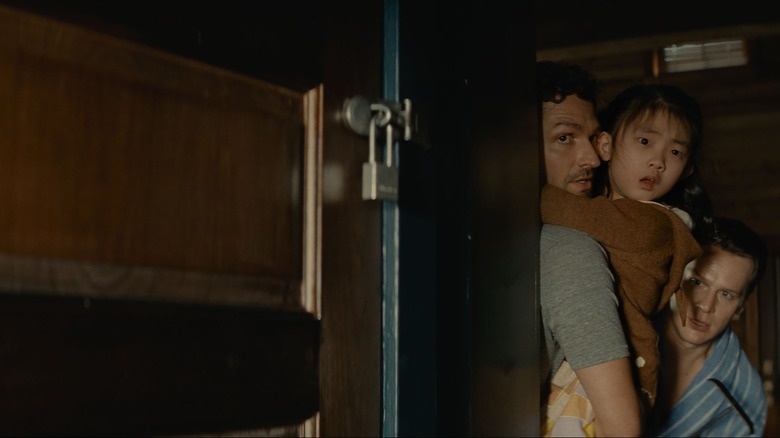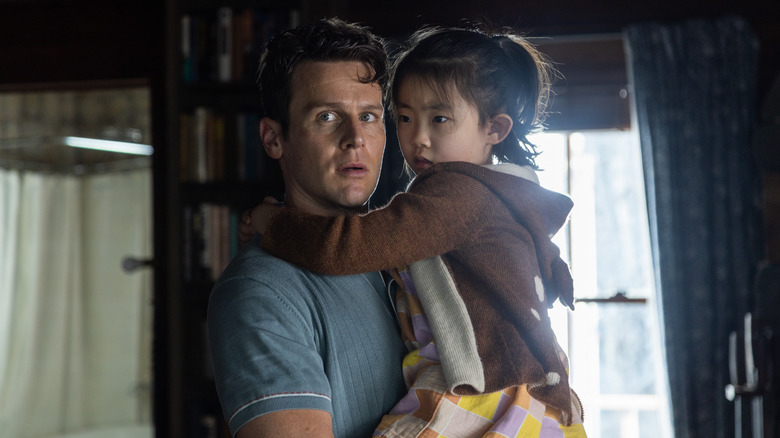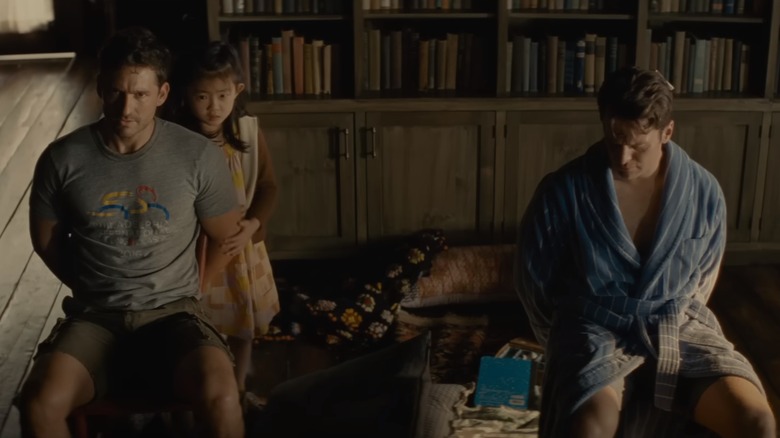Knock At The Cabin Isn't The Best M. Night Shyamalan Movie, But It's Definitely The Most M. Night Shyamalan Movie
This article contains spoilers for "Knock at the Cabin."
"Our choices make our destiny." Early in "Knock at the Cabin," after a small family's idyllic vacation is quite literally shattered by the home invasion of four imposing strangers carrying apocalyptic portents of doom, the quiet giant Leonard (Dave Bautista) informs his captives that they have the power to save the world — but only if they willingly choose to do so. Of course, that takes on a slightly different tone when the actual decision involved requires either killing one of their own or condemning humanity to a grisly fate.
The fickle and sometimes illusionary (though no less potent) nature of choice in this trolley problem writ large isn't exactly an unheard-of topic for M. Night Shyamalan, not when the filmmaker already has such movies as "The Sixth Sense," "Unbreakable," "Signs," and "The Village" under his belt. All deal with protagonists either backed into a corner as a result of the choices made by others ... or by self-destructive ones that they themselves have made. While Shyamalan's reputation has been dogged by accusations of cheap plot twists and rug-pulls, those criticisms largely miss the mark by ignoring the larger concerns that truly inform the auteur's work.
While "Knock at the Cabin" presents itself as a straightforward thriller that's enjoyable enough on its many surface-level charms (/Film's review by Chris Evangelista calls it Shyamalan's "return to form"), it all but demands a deeper reading from an audience that's willing to meet it halfway. Nobody's calling for an exhaustive deep-dive into Shyamalan's entire filmography here, but even a cursory look at his past movies reveals just how well his latest fits in with those that came before. It may not be his best, but it's certainly the most Shyamalan movie yet.
Family matters
"The Sixth Sense" wasn't Shyamalan's feature film debut, but it did kick off a three-film run with "Unbreakable" and "Signs" that represents one of the filmmaker's go-to narratives: taking a fractured family, putting the screws on them in unbearably tense circumstances, and seeing how they come through the other side.
"Knock at the Cabin" represents his most effective return to that earlier thematic concern (though with admirable stops along the way with 2021's "Old" and even the Apple TV+ series "Servant"), focusing on the family made up of Eric (Jonathan Groff), Andrew (Ben Aldridge), and their adopted daughter Wen (Kristen Cui) navigating a harrowing and traumatic experience at the hands of four strangers claiming to have shared visions of future destruction. Though based on the novel "The Cabin at the End of the World" by Paul Tremblay, making this a departure for a filmmaker who has largely avoided adaptations, it's clear why this premise appealed so strongly and made such a natural addition to his oeuvre. Just as "The Sixth Sense" used ghosts to bring a mother and her troublesome son to a deeper understanding of each other, "Unbreakable" united an estranged father and husband with his family through superheroics, and "Signs" resorted to an alien invasion to forge a family unit torn apart by grief, "Knock at the Cabin" argues that only the purest familial love can save the world from an impending apocalypse.
In vintage Shyamalan fashion, however, the point of these stories is never the horror alone; it's about how the ordeal changes our protagonists, forces them to shift their perspectives, and ultimately make choices in the end that they never would've even conceived of doing in the beginning. Forget plot twists; the best Shyamalan movies have always been defined by family.
Beggaring belief
For storytellers obsessed with ideas like free will vs fate, or skepticism vs belief, there's perhaps no greater way to explore these questions than by allowing stories to take a turn for the supernatural.
Whether it be a sixth sense, superpowers, the existence of aliens, monsters hidden just outside of secluded villages, or even a beach that makes you old, all of these genre exercises served one incredibly important purpose. By lowering the guard of viewers with easy-to-grasp genre trappings, Shyamalan could slip through our defenses and strike right at the heart of it all. As much as viewers get caught up in left-brain logic (aliens with a weakness for water came to a planet that's 75% water? Come on!) these films always rewarded those who apply a more philosophical approach.
"Knock at the Cabin" dispenses entirely with metaphor in favor of a blunt-instrument approach, not unlike the ones that Leonard and his cohorts carry with them at all times. The one predominant focus of the entire movie revolves around whether these armed and dangerous strangers are telling the truth about the end of the world, or if they've simply deluded themselves into buying what they're selling. While Andrew argues in favor of rational explanations to explain away a number of odd coincidences, Eric begins to doubt and believe that some things simply can't be resolved by logic.
If Shyamalan could've reached through the screen to spell out how this applies to detractors who cite "realism" as a flaw in his movies, I imagine he would've done so. The popular conception of Shyamalan cites stilted and awkward dialogue, "bad" acting, and plot twists as his calling cards. In actuality, he's simply a filmmaker exploring whether we can choose to take a leap of faith.
Seeing eye-to-eye?
It's important to acknowledge that directors like Shyamalan simply won't be for everyone. Where some see an intentional and playful sense of humor that's fully in on the joke, others see po-faced self-seriousness. What fans embrace as B-movie schlock, dissenters claim to be the death of cinema. When attempting to figure out why some filmmakers have a tendency towards creating divisive works of art, blame can be pointed any which way. But who says crowd-pleasers need to be the intended goal, anyway? Oftentimes, different perspectives are exactly what makes art so interesting, to begin with.
So how can so many look at the same projects and come away with such vastly irreconcilable differences? Well, that just so happens to be addressed in many of Shyamalan's own movies, too.
Perhaps more than any other aspect covered in this article, the idea that characters are desperate for a sense of mutual understanding yet struggle to find the tools to communicate rings true in all of the director's best work. When you think back to the most affecting moments in Shyamalan's filmography — a father attempting to convince his gun-wielding son that he's not a superhero, two lovers on a porch attempting to express their affection for one another, or two brothers debating the idea of miracles vs coincidences — what leaps out the most is how Shyamalan focuses on and even emphasizes the yawning gaps that lie between them.
In "Knock at the Cabin," the entire climax hones in on the differences in worldview between husbands Eric and Andrew. Being unable to see eye-to-eye is okay, the ending seems to argue because that's what allows us to appreciate everything we have in common. As always, it comes down to choice.
"Knock at the Cabin" is currently playing in theaters.



